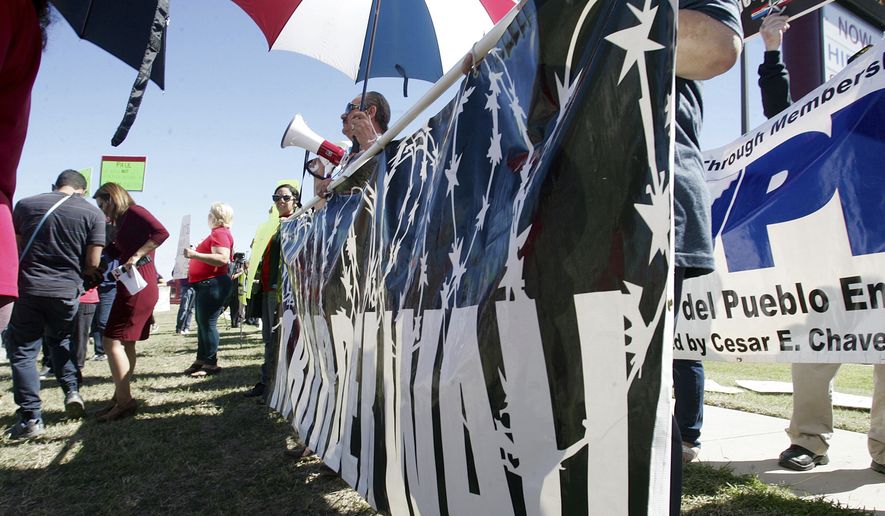OPINION:
The fight over who controls U.S. immigration policy is about to enter Round Two. President Trump pledges to come out swinging with a reformulated restriction on prospective immigrants. He seems deadly serious about defending the nation’s borders, and those who want to throw open the borders to everyone seem just as determined to stop him. The outcome will determine nothing less than who defines America.
“We will have strong borders again,” the president told a weekend rally in Orlando, “and I mean that.” A revised executive order is being drawn up to tiptoe around the weaknesses in the original executive order he signed last month. The revised order would still impose a temporary ban on travelers from the seven Muslim-majority nations suspected by two presidents of exporting radical Islamic violence, but would enable green card holders to enter without hindrance. Barring them was part of the uproar the first time around. Allowances would be made for foreign travelers with valid visas and for those in transit to other destinations. A section of the original order giving special consideration to refugees suffering religious persecution — i.e., Christians who always have a hard time in majority-Muslim countries — has likely been eliminated.
Mr. Trump’s opponents will continue to throw everything they can devise against the courtroom wall in hopes something sticks. The president was set upon by the 9th U.S. Circuit Court of Appeals in Seattle when his original executive order, following soon after his inauguration, temporarily blocked persons from those seven problematic nations. The court, the most liberal and the most-often reversed of all the federal appeals courts, agreed to stay implementation of the president’s order. The plaintiff states argued, among other fanciful things, that the president’s immigration order could cause states financial harm by preventing foreign students from paying tuition at their state universities.
If the president’s reworked executive order eventually reaches the evenly divided U.S. Supreme Court, a familiar 4-4 tie vote would leave the 9th Circuit Court of Appeals, and not the president, with the final say over immigration policy.
The High Court is currently considering whether a foreigner with no ties to the United States has rights guaranteed by the U.S. Constitution. The court heard arguments this week in a case titled Hernndez v. Mesa, in which a U.S. Border Patrol officer was sued for shooting across the border at a young suspect in Mexico, killing him. If the justices break with well-established precedent and apply constitutional protections to a person outside the United States, prospective immigrants seeking to come into the United States could be empowered to challenge Mr. Trump’s travel restrictions.
The stay of the immigration order has added to the flood of those fleeing terror. The number of refugees granted entry from Iran, Iraq, Libya, Sudan, Somalia, Yemen and Syria rose by 77 percent in the week following the court decision. Those seven nations were the origin of 67 of the 390 foreign nationals arrested on terrorist-related charges since the Sept. 11 attacks. The stubborn refusal to face those facts leads inevitably to the conclusion that open-border ideologues in Washington are pursuing their own agenda, and not the best interests of the United States.
President Trump vows to keep up the fight to regain control over who gets to come to America. “We don’t give up,” he says. “We never give up.” Neither, alas, do those who regard the nation as the big rock-candy mountain that belongs to everyone. To the victor goes the United States.




Please read our comment policy before commenting.